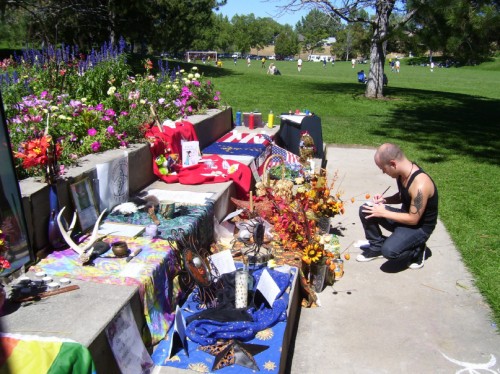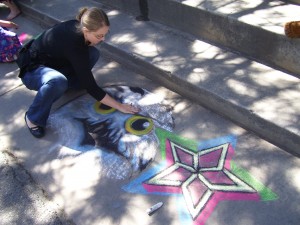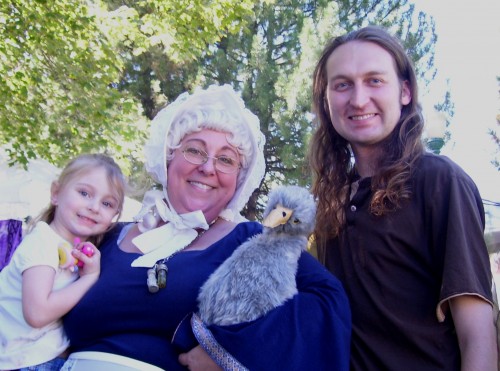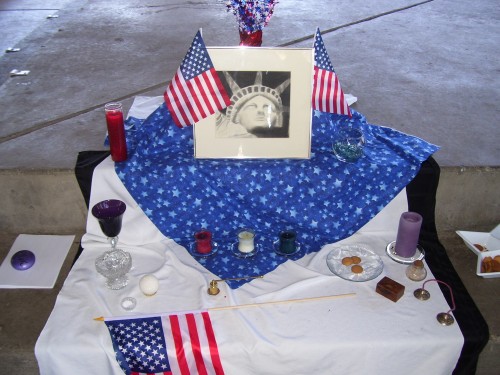Murray hosts annual event inviting local pagans to “come out of the broom closet”
by Jacob Hodgen
It was an ordinary summer day in Murray Park, with all the usual events: kids playing soccer, families having picnics, and Pagans performing rituals.
That’s right. You heard me. There is indeed more than one religion in Utah.
Utah’s 10th annual Pagan Pride brought together one of Utah’s most colorful and friendly communities, featuring an interfaith gathering of Pagans, Wiccans, Druids, Gnostics, and many others.

The family friendly event is held each year and is designed to “foster pride in Pagan identity through education, activism, charity and community.” This year’s gathering was held in Murray and featured a wide variety of activities and booths, including chalk art, tarot reading booths, crystal and incense vendors, a colorful set of altars and shrines, a collection for the Utah Food Bank, and storytelling for kids by Mother Goose.
Experts within the community also held various seminars featuring topics like the Egyptian Book of the Dead, belly dancing, Paganism in the military, and chakra cleansing.
Paganism has been the brunt of many negative and downright false portrayals in Hollywood over the years. In reality, the term describes a broad group of some of the most ancient and common beliefs in human history, many of which focus on worshipping nature and the earth through a diverse pantheon of deities.
 One of the day’s events features a “bardic circle,” which is the great grandfather of the “open mic” session. Participants gather around a small bonfire and take turns passing around a guitar and a chance to share something. One of the performers is Windwood, and he sings a humorous song about making peace with one’s self. He says he has been a practicing Pagan for 16 years, and he holds a similar bardic circle every month at this his house. “A bard carries on the songs and the stories of the people,” he tells me. “The circle is an opportunity to get together and share creative elements through joke, song, and verse.”
One of the day’s events features a “bardic circle,” which is the great grandfather of the “open mic” session. Participants gather around a small bonfire and take turns passing around a guitar and a chance to share something. One of the performers is Windwood, and he sings a humorous song about making peace with one’s self. He says he has been a practicing Pagan for 16 years, and he holds a similar bardic circle every month at this his house. “A bard carries on the songs and the stories of the people,” he tells me. “The circle is an opportunity to get together and share creative elements through joke, song, and verse.”
Rita from the Earth Haven group says that Pagans tend to be a very open and friendly community, even when there are a wide variety of beliefs between them.
“We are in a minority,” she tells me, “and it serves us to cooperate as individual minorities as part of a larger group. Paganism allows for a lot of diversity. You don’t have a lot of people saying ‘this is the one and only true way.’ Paganism is what speaks to the heart. It is wherever your desire for fulfillment leads you.” Despite Utah’s recent bad reputation for intolerance on the national level, Rita says that she has had a relatively positive experience here. “Mormons have their own recent tradition of religious persecution from others. This makes our ability to practice and work in the Salt Lake environment easier than it could be.”

One of the most popular events of the day is an appearance by Mother Goose and her goose friend Fooble for storytelling and fairy tales. “Most fairy tales are based on Pagan lore,” she says. “If you spend time going through nursery rhymes, you’ll find out a lot about not only our traditions, but of the history of how humans embrace spirituality.”
In fact, contemporary Christianity owes an especially large debt to Paganism, as the now ubiquitous symbols of Christmas, the “Sun-day” Sabbath, the cross, the Ichthys or “Jesus Fish,” and the Christmas tree were each taken directly from the Pagan tradition by the early Christian church.

Of all the symbols and events at the festival, one of the most striking is the tribute to the goddess Columbia. Better known to most Americans as the Statue of Liberty, many contemporary Pagans see her as a symbol for religious tolerance and diversity. With this in mind, a short ceremony was held to commemorate religious freedom and memorialize the tragedy of Sept. 11th.
“Our Founding Fathers came here to get away from religious persecution,” say Shelby Walker and Jancy Loughridge from the Order of Our Lady of Salt group. “Lady Liberty is not just about one set of beliefs. She has different meaning for everybody. To us, she stands for tolerance, the ability to love who you want and what you will, and more equality for women.”
Whether or not Paganism is the path for you, they want you to know that they are here to stay, and they are “coming out of the broom closet.” §

